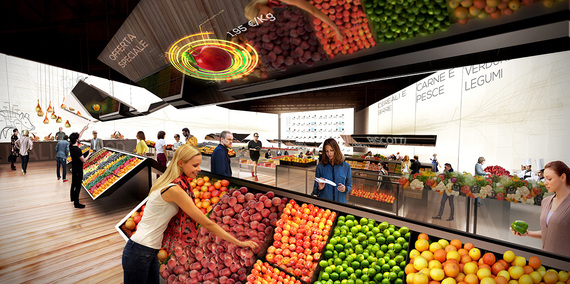The first impression is, of course, quite overwhelming: from the start, the crowds waiting in line, the grand main boulevard, and the spectacular pavilions convey that we are witnessing a unique event. Despite the construction delays, lack of organization and, unfortunately, corruption, which dominated the Italian public debates for the past couple of years, the Expo started in Milan on May 1st as scheduled. Not everybody is happy, as the "No Expo" riots that erupted in the center of the city on the day of the inauguration indicate. The initiative was decried as an example of bad administration, unsustainable construction, and exploitation of workers.
The theme of the expo is "Feeding the Planet, Energy for Life," singling food out as one of the most important issues for the 21st century. This was an interesting move for the Bureau International des Expositions, the institution in charge of organizing these events every five years since 1928 (the first one took place in London 1851). Over time, the goal of the expos has changed, shifting from the celebration of modernity, science and business to a more reflective approach that assesses the present to envision the future. The theme for the next one, which will take place in Dubai in 2020, is "Connecting Minds, Creating the Future," focusing on sustainability, mobility, and opportunity for entrepreneurship and innovation.
I did not visit all the pavilions: I doubt a week would allow for that. My personal impression is that few of the pavilions at the Milan Expo offer any real food for thought, with some lacking any kind of message at all. In an exhibition dedicated to food, one would have expected more food design. At times, the very theme of the event turns into an occasion for the promotion of tourism or commercial enterprise. Of course, one could not expect much coherence, as countries, enterprises and institutions participate with different priorities and goals, and extremely diverse financial means.
Some of the pavilions are very interesting. For instance, the Holy See focuses its small exhibition on hunger. Pictures, videos and a long table on which images are projected send a clear message and invite visitors to reflect and take action without making them feel excessively guilty or superficial. The U.S. pavilion (for which I worked as an adviser) is among the biggest and most content-rich. Its exhibition space unfolds over two floors. The upper one points to contemporary issues, from research and innovation to sustainability and local production, while the lower one is a guided exploration of various aspects of American cuisine. Visitors are actually expected to read, listen, and reflect! The Slow Food pavilion, harshly critiqued by McDonald's, fully embraces sustainability starting from its open wooded structure. Its exhibition is purposely low-tech-at times to a fault-with activities and spaces for children and adults to learn.
Some countries, such as France and Russia, chose a middle path between a purely visual exposition and the use of textual or audio material. The Netherlands decided instead to go all out for fun, creating a space reminiscent of a low-key amusement park, with live musical performances. I have been told by reputable sources that the pavilions of Japan, Korea, Italy, Germany, Austria, and Angola are all interesting, each in its own way.
I left the Expo wondering what visitors get out of it, and what are their motivations to go in the first place. Is it the veneer of cosmopolitanism, or rather the excitement of participating in a once-in-a-lifetime event? Is it the specific theme - food - that resonates so deeply? Is it the desire for an unusual form of entertainment that also promises some sort of educational aspect? The Expo's appeal seems to be proven by the numbers, which unofficially tout almost 3 million guests over the first month. At a time when globalization and technology bring humans together on a daily basis both in reality and in virtual spaces, it is surprising to see how people from all over the world desire to come together and share a common experience, even if just for a day.
